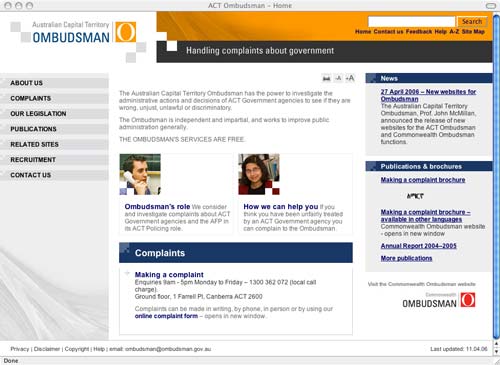Ombudsman review
Ombudsman review
Introduction
 This has been a year of change in the ACT Ombudsman's office. New work practices, a new complaints management system and the formation of the Public Contact Team have been key activities during the year.
This has been a year of change in the ACT Ombudsman's office. New work practices, a new complaints management system and the formation of the Public Contact Team have been key activities during the year.
The office continues to deal with a range of complaints from ACT residents seeking assistance on matters as diverse as building applications, public housing, vehicle registration, child protection, policing and correctional services, and whistleblower protection.
In its 17 years of operation, the ACT Ombudsman's office has been able to stimulate improvements in government administration through the experience and insights gained from handling complaints. Areas include the quality of decision making, internal complaints handling, transparency, record keeping, communication with the public, sensitivity to individual needs, and government accountability generally.
By fostering improved government administration, we can strengthen the community's confidence in the integrity and professionalism of government and we can support fairer and more accountable government.
The organisation
The role of the ACT Ombudsman is performed under the Ombudsman Act 1989 (ACT). The Ombudsman also has specific responsibilities under the Freedom of Information Act 1989 (ACT) and the Complaints (Australian Federal Police) Act 1981 (Cth), and is authorised to deal with whistleblower complaints under the Public Interest Disclosure Act 1994 (ACT).
The ACT Ombudsman is an independent statutory officer who considers complaints about the administrative actions of government departments and agencies and aims to foster good public administration by recommending remedies and changes to agency decisions, policies and procedures. The Ombudsman also makes submissions to government on legislative and policy reform.
The office investigates complaints in accordance with detailed written procedures, including relevant legislation, a service charter and a work practice manual. It carries out complaint investigations impartially, independently and in private. Complaints may be made by telephone, in person or in writing (by letter, email or facsimile, or by using the online complaint form on our website). Anonymous complaints may be accepted.
The key values of the ACT Ombudsman are independence, impartiality, integrity, accessibility, professionalism and teamwork.
Overview
Complaints statistics
Complaints handling remains the core of the ACT Ombudsman's role. In 2005–06, the office handled 865 approaches and complaints from the public about ACT Government agencies and ACT Policing. This was an overall decrease of 11% on the 969 approaches and complaints handled in 2004–05. The decrease was mainly due to a reduction in complaints received about ACT Policing. The complaint investigation role of the office is dealt with in the 'Performance' section of this report.
There was a small decrease in the number of approaches and complaints received about ACT Government agencies, as distinct from ACT Policing complaints (512 in 2005–06, compared to 526 in 2004–05).
Significant numbers of approaches and complaints were received about Housing ACT (105, compared to 94 in 2004–05) and ACT Corrective Services (97, compared to 107 in 2004–05).
There was an increase in approaches and complaints about ActewAGL (27, compared to 11 in 2004–05) and the Department of Urban Services (36, compared to 21 in 2004–05).
We saw a decrease in approaches and complaints about Roads ACT (42, compared to 57 in 2004–05), Office for Children, Youth and Family Support (37, compared to 53 in 2004–05), and ACT Planning and Land Authority (37, compared to 49 in 2004–05).
In 2005–06, there was a 20% decrease in complaints received about ACT Policing (353, compared to 443 in 2004–05). This indicates a general decrease in the number of complaints made about ACT Policing over the past eight years.
Analysis of complaints received and finalised is provided in the 'Performance' section of this report under the headings 'Complaints—ACT Government agencies' and 'Complaints—ACT Policing'.
Submissions and major investigations
A distinct role of the Ombudsman is to contribute to public discussion on administrative law and public administration and to foster good public administration that is accountable, lawful, fair, transparent and responsive.
In this context, we made submissions to, or commented on, a range of administrative practice matters, cabinet submissions and legislative proposals during the year.
We finalised a long-standing major investigation under the Public Interest Disclosure Act 1994 (ACT) (PID Act) relating to an allegation of unlawful reprisal. This case is discussed in the Public Interest Disclosure section on page 25. The investigation underscored the importance of agencies being fully aware of the requirements of the PID Act and being alert to the possibility that a workplace complaint might qualify as a PID, even when not declared to be one.
Highlights
To ensure effective complaint handling and investigation, the office puts considerable effort into improving office systems and building relationships with other agencies and groups in the community.
In 2005–06, we focused attention on improving the effectiveness of our operations in the areas outlined below.
Complaints service
We recognise that if we are to continue to maintain relevance and effectiveness in a strategic manner, we need to evolve with the changing environment in which we operate. At times we criticise other agencies and recommend that they implement better and fairer systems and procedures. This underscores the importance of being rigorous in our own work practices and continually striving for improvement.
In the last two years, we have reviewed many of our internal policies and processes to evaluate their quality, consistency and accountability. As a result, we adopted a new approach to complaints resolution, created the Public Contact Team to manage more efficiently the approaches we receive annually, and introduced a new complaints management system. We also responded to feedback on the difficulties people sometimes experience when we refer them to the agency they are complaining about, and collaborated with other ombudsmen in Australia about the management of unreasonable complainant conduct.
We have also taken a new approach to managing and handling complaints. In October 2005, we implemented a five-tiered structure for categorising and responding to complaints, based on the type of approach, the degree of effort required to resolve the complaint, and any potential sensitivities. The categories range from simple contacts that can be resolved without investigation through to the formal use of the Ombudsman's powers. This tiered structure ensures that complex or sensitive matters are assigned to senior, experienced officers and delineates a clear path for reconsideration and review.
These and other changes to the work practices of the office were introduced by thorough work practice training for all staff members and a comprehensive online work practice manual.
The new complaints management system supports the office's work practice changes and provides significant enhancements over the previous system, including:
- improved network response times
- simplified data entry capabilities and the ability to capture data more effectively
- capacity to structure workflows
- improved reporting capability
- increased user assistance
- simplified system administration
- standard application interface to allow for future development
- greater interoperability with other office products and systems.
A key feature is the strength of the system's workflow capability. This allows the office to build in procedures to the complaints management system that will help investigation officers in their management of both individual complaints and complaint workloads. We expect this will lead to greater efficiency and better service delivery to people using the office.
A redeveloped ACT Ombudsman internet site was launched in April 2006, using a web content management system framework and an enhanced search facility. We improved content and added new features, including an improved online complaint form in response to the growing use of internet services.

Homepage of redeveloped ACT Ombudsman internet site (www.ombudsman.act.gov.au)
Public administration and complaints handling
As in previous years, the office provided input on significant ACT Government projects during the year, including further input on the ACT Prison Project and comments on the new Public Interest Disclosure Bill 2006. Our expertise in public administration helps us to ensure that best administrative practice is integral to government planning and decision making.
Ombudsman staff continued to hold regular meetings with agency contact officers to maintain the good working relationships so important to timely and effective resolution of complaints.
Outlook for 2006–07
We continue to operate under a memorandum of understanding (MOU) with the ACT Government for the provision of Ombudsman services in relation to ACT Government agencies and ACT Policing.
We are working to finalise negotiations for a new MOU, which will take account of expected impacts on the complaints workload of the office. This includes developments such as the new ACT prison and changes to the way complaints about ACT Policing are managed.
Before 2005–06, the Ombudsman conducted seminars for ACT Government complaint contact officers, aimed at increasing the practical complaints-handling skills of those officers, as well as enhancing their understanding of the role of policy and legislation in decision making. This program will resume in 2006–07.
In 2006–07, major reforms to the Australian Federal Police (AFP) complaints-handling system contained in the Law Enforcement (AFP Professional Standards and Related Measures) Act 2006 will require changes to the Ombudsman's current role in overseeing complaints about the alleged conduct of AFP members. These reforms will remove the requirement for joint handling of all complaints. AFP line management will deal with minor matters, providing a faster and more efficient method for resolving these issues. More serious matters will continue to be notified to the Ombudsman's office, with primary responsibility for resolving these matters remaining with the AFP. See Appendix 1 for further information.
Ombudsman staff will continue to be active in ensuring that the AFP's complaints management system provides an effective response to individual complainants and provides public assurance about police accountability.
Recent restructuring of the Ombudsman's Law Enforcement Team has allowed for further development of our own motion investigation functions relating to ACT Policing. These own motion investigations will focus on areas where police interaction with the public remains problematic.
Conclusion
This year's annual report covers a range of activities on which the Ombudsman is able to report, including how complaints about government were handled, the response by ACT Government agencies to accountability requirements, and issues in ACT Policing.
During the year, the ACT Government decided to restructure the ACT system for statutory oversight of government administration. I am pleased that it was decided to continue the link between the ACT Ombudsman and the Commonwealth Ombudsman. That arrangement has worked well for 17 years, and both offices benefit from the integrated function. I look forward to discharging the Ombudsman role in the ACT in the coming year and to being an active part of the ACT system for resolving the difficulties and problems that people experience with government.
Prof. John McMillan
Australian Capital Territory Ombudsman
